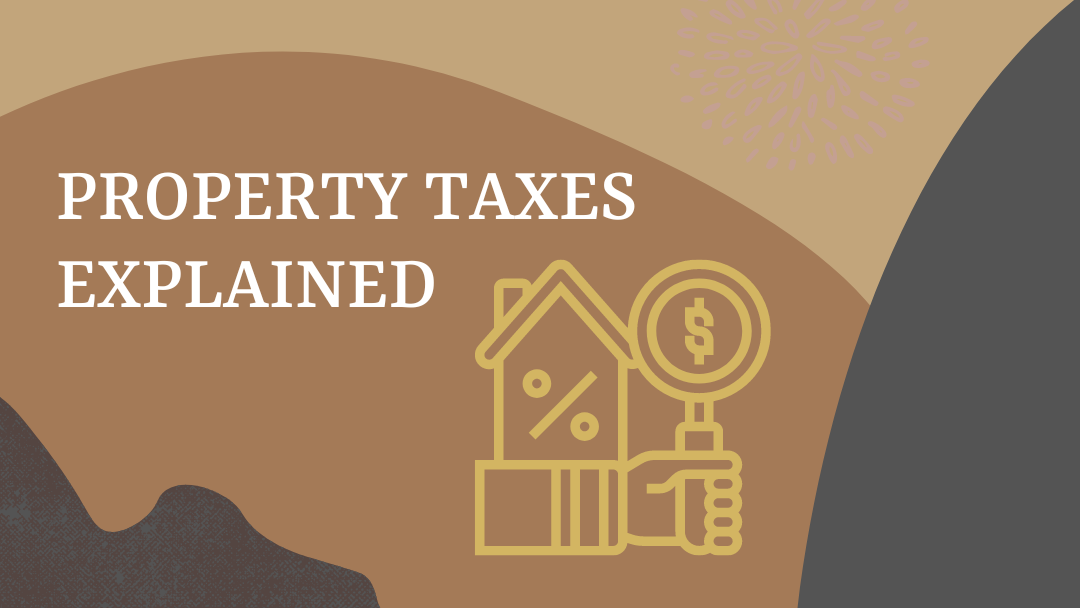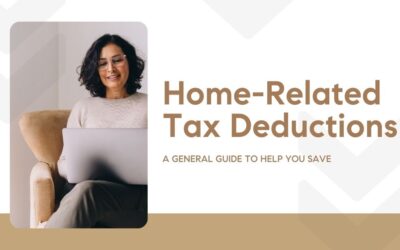As a top real estate agent, I’ve seen it all when it comes to property taxes. Some homeowners eagerly wait to receive the tax bill in the mail so that they can whip out their checkbook and take care of it.Then there are others who break out into a cold sweat just thinking about the annual tax assessment. Regardless of your category, it is always worth understanding better how officials calculate property taxes and when they are due, so that you can stay on top of it all. Let’s take a closer look at what property taxes are and why you should care.
Do I Really Need To Pay Property Taxes?
Property taxes are levied by local governments on the value of real property. These taxes fund public services such as schools, police and fire departments, roads, and other local infrastructure. The amount of property tax one owes is based on the assessed value of the property, determined by the county assessor’s office. Homeowners pay property taxes paid bi-annually, and failure to pay results in severe consequences including:
- Penalties and Interest – Delinquent payments are subject to penalties and interest that accrue at the rate of 10% annually.
- Loss of Tax Benefits – A person who does not pay their property taxes may lose any tax benefits associated with ownership of the property, such as deductions or credits for homeownership expenses.
- Legal Action – The county may take legal action against a person who does not pay their property taxes, including filing a lien on the property and initiating foreclosure proceedings.
- Loss of Homeownership Rights – Non-payment of taxes may initiate foreclosure, and the homeowner could permanently lose their rights to the residence, resulting in court official evicting the homeowner.
Property taxes are an important source of revenue for local governments, and play a critical role in ensuring the provision of essential public services to local communities. So don’t mess around when it comes to paying your taxes on time. Your home could very well be at stake.
Calculating Property Taxes
Officials calculate Bay Area property taxes in several parts. The first part is an Ad Valorem tax based on the assessed value of the property along with other bond obligations that voters approve of. For Alameda and Contra Costa counties, the base tax rate is 1% of the assessed property value. When you add in the city and county bond obligations, the base rate increases to 1.2172% in Alameda County and 1.4324% in Contra Costa County.
In addition to the Ad Valorem taxes, each city and county also includes voter approved special assessments to the property tax bill. These taxes pay for things like parks, libraries, schools, roads, and other public infrastructure. Since every city has a different set of taxes that last for various amounts of time, it is difficult to provide an exact tax rate for your particular property.
In order to estimate how much homeowners will pay in property taxes, I have taken to using 1.7% of the property value as a conservative average. If you purchase a home for $1,500,000 you can then expect to pay roughly $1,500,000 x 1.7% = $25,500 annually in property taxes. This tax bill is broken into two payments of $12,750 each as discussed in more detail below.
Secured vs. Unsecured Property Taxes
Taxes that are levied on what is known as “Real Property” are considered secured. Real property generally consists of land and unmovable improvements attached to that land, such as your home. The taxes are “secured” by the “Real Property” in that the county can make a claim to the property (also known as a lien) in the event the a homeowner does not pay their taxes.
Unsecured property taxes are taxes levied on personal property such as a boat or airplane, or personal equipment such as machinery or office furniture. Since these items are typically movable and can’t be relied upon to be available in the event of a tax delinquency, these types of taxes are considered unsecured.
For most people, it is not very common to have unsecured tax bills. However, it is worth keeping track of such liabilities in the event you do have capital equipment or other expensive items that are recorded with the county and subject to taxation.
Key Property Tax Dates
JULY 1 – Beginning of a new fiscal year. Close of assessment roll and the start of the new assessment roll year. The assessment roll is the official list of all taxable property within the County.
AUGUST – Officials mail out redemption notices for delinquent/defaulted Secured Property Taxes from the prior fiscal year.
AUGUST 31 – Unsecured Property Tax payment deadline. Officials add a 10% penalty plus $30 collection fee if not postmarked by August 31st.
SEPTEMBER 1 – The tax collector transfers unpaid Unsecured Property Taxes to the Collections Division. The Collections Division adds other fees with continued delinquency. Also, last day to request mailing address changes for annual secured tax bill.
SEPTEMBER – OCTOBER – Officials mail out Secured Property Tax bills. They are also online.
NOVEMBER 1 – First installment of Secured Property Taxes due; officials file liens for all delinquent Unsecured Property Taxes and add a 1.5% per month penalty to the outstanding amount due.
NOVEMBER 30 – Last day to file an assessment appeal application for reduced assessment with the Clerk of the Board of Supervisors for annual tax bills.
DECEMBER 10 – Last day to pay First Installment of Secured Property Taxes (late payments incur a 10% penalty if not postmarked by December 10th).
JANUARY 1 – This is the date when taxes for the next fiscal year become a lien on the property.
FEBRUARY 1 – Second installment due on Secured Tax Bills.
FEBRUARY 15 – Deadline to file exemption claims timely and receive full exemption on Secured Property Tax bills collected in upcoming fiscal year.
APRIL 10 – Last day to pay Second Installment of Secured Property Taxes (late payments incur a 10% penalty plus a $20.00 collection fee if not postmarked by April 10th).
MAY – Officials mail out delinquent notices for any unpaid First and Second Installment Secured Property Taxes.
JUNE 30 – End of fiscal year. Last day to start a five-year payment plan for delinquent/defaulted Secured Property Taxes that have at least one installment delinquent for over five years and are eligible to start a payment plan.
JULY 1 Beginning of another fiscal year. Officials transfer delinquent secured accounts to the defaulted tax roll and add additional penalties at 1.5% per month on any unpaid tax amounts, plus a $15 redemption fee. Alternatively, some refer to these bills as prior year Secured Taxes or Defaulted taxes.
Supplemental Taxes
Should a property undergo renovation or a change in ownership, it is referred to as a ‘supplemental event’ and triggers a new appraisal to determine the current value of the property. In most cases, the appraised value will be the same as the price paid for the property. Any increase in property value resulting from the appraisal is reflected in an updated assessment and a prorated supplemental bill.
Assuming the supplemental assessment shows an increase in value, the county auditor will calculate the increase in taxes based on the new value. Afterward, the county tax collector will generate and send one or two supplemental tax bills. This bill covers the period from the first day of the month following the supplemental event to the end of the fiscal tax year.
Keep in mind that the property tax fiscal year runs from July 1st through June 30th of the following year.
If a supplemental event occurs between July 1st and December 31st, officials only issue one supplemental tax bill. This bill accounts for the property’s change in value for the period between the first day of the month following the event date and the end of the current fiscal year. If, however, a supplemental event occurs between January 1st and May 31st, officials issue two supplemental tax bills. The second bill accounts for the property’s change in value for the entire 12 months of the coming fiscal year, beginning on the following July 1.
Property Taxes When Buying or Selling a Home
When you buy or sell a home there will be a credit or debit for property taxes on your final closing statement from the escrow company.
When buying a home you will likely see a debit on your statement as the previous owner likely paid some portion of property taxes and you will owe them the prorated balance from the date you take ownership of the property until the end of the current tax period.
For selling a home, you will see a credit on your statement if you have already paid property taxes for the current tax period. The buyer will owe you the difference of the amount you paid, minus the prorated amount the new owner will be responsible for beginning on the day that title is transferred into their name.
Making Calculations
Using the example, let’s assume you purchase a $1,500,000 house assuming a total tax rate of 1.7% (the actual amount will vary) and the previous owner made the first installment payment of $12,750 on the November 1st due date. Homeowners pay the taxes through December 31st and you will owe the prorated portion from when you take ownership. Using the 30 day month for 6 months equals a total of 180 days or $70.83 per day. You owe 30 days of property taxes (even though December has 31 days, the calculation is 30 days in each month for convenience) so you would see a debit on your closing statement for 30 x $70.83 = $2,125. The seller would see a credit on their closing statement for the same amount, $2,125.
For ease of calculation, property taxes are prorated daily based on a 30 day month. So, for example, if you were to purchase a home that closes on December 1st and the previous owner already made the first installment payment, you would owe property taxes from December 1st through December 31st. Remember that the first installment payment covers the period from the beginning of the fiscal tax year on July 1st, through the first half of the year ending December 31st.
This can be confusing for many buyers and sellers, so don’t hesitate to contact your escrow company and title officer if you ever have questions about line items on your closing statement.
Conclusion
Property taxes and supplemental tax bills can be a big shock for new homeowners. But with a little bit of knowledge and preparation, you can stay on top of your tax obligations and avoid any surprises. As a top real estate agent I always help my clients understand property taxes so they can focus on enjoying their homes without any unnecessary stress.
If you have further questions or would like more detailed property tax estimates for a particular property please don’t hesitate to contact me for more information. If you are considering purchasing a home I can set-up an automated search with your specific criteria and email it to you daily. My goal is to help my clients build generational wealth for their families and the process always starts with education.
——
Disclaimer: Please note that while I strive to provide accurate and helpful tax information for homeowners, I am not a tax expert or a certified public accountant. Please consider the information I provide as a general overview of tax dates, and not as specific tax advice. Before making any decisions regarding your tax situation, please consult with a qualified tax professional who can offer you personalized advice based on your unique circumstances. I am not responsible for any errors or omissions in the information provided, and I disclaim any liability for any actions taken based on the information contained in this blog post.




